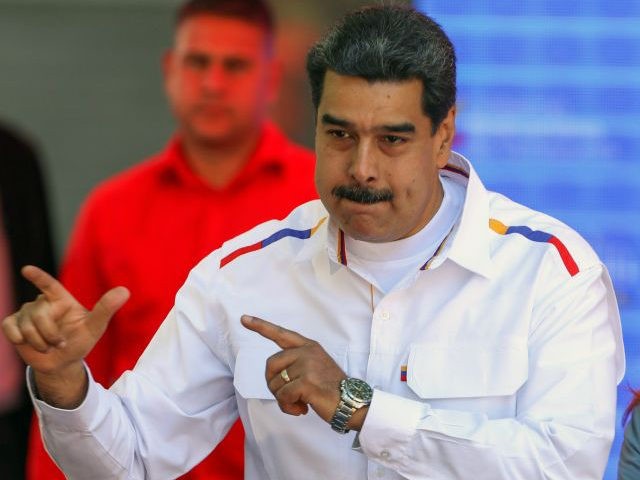Venezuela’s socialist dictator Nicolás Maduro, in an telephone interview given to Argentina’s Radio 10 on Sunday, suggested that the government of Argentina should implement a “hate speech” law, similar to the one passed by his regime in 2017, following the alleged assassination attempt against Argentina’s vice president Cristina Fernández de Kirchner on Thursday.
Last Thursday, a 35-year old man was arrested in Argentina after apparently attempting to assassinate the South American nation’s vice president, Cristina Fernández de Kirchner as she was returning to her residence in the city of Buenos Aires. The alleged assassination attempt took place as the far left politician and former President of Argentina faces a trial that could see her serve 12 years in prison on multiple charges of corruption.
Maduro, in an interview given to Argentinian priest Juan Carlos Molina on Sunday, said that the alleged attempt on Fernández de Kirchner’s life was “the result of an accumulation of hate campaigns and a psychological warfare by those who run big media and big social networks.”
#EnVivo 📹 | Entrevista Especial en el Programa “Rompiendo Moldes” de la Radio 10 de la República de Argentina.
https://t.co/kBrGfoSM1z— Nicolás Maduro (@NicolasMaduro) September 4, 2022
“Incredible that this is happening in the 21st century, an event of these characteristics — and truly this attempted assassination has marked the entire continent, setting off alarms about how far they can go, what are the limits of violence, of hatred, how far, where can it get to?” Maduro commented.
Maduro, who during the interview denied that his regime engages in any form of censorship despite the sheer amount of evidence to the contrary, went on to advocate the “Law Against Hate” his socialist regime passed in 2017. The law enabled the Maduro regime to sentence “hate speech” offenders to up to 20 years in prison.
The Maduro regime has used the anti hate-speech law, and its deliberately ambiguous definition of the term “hate speech,” to heavily curb dissent and force opponents into self-censorship. It has also been used to persecute those who criticize or protest over the precarious state of Venezuela’s public utilities, and even those who criticized the regime’s Chinese Coronavirus pandemic measures.
The law has also been used to punish satire, as in the case of Olga Mata, a 72 year old Venezuelan woman arrested in April for having posted a comedic video online that satirized members of the Venezuelan regime through the use of dark humor and colloquialisms. The the regime classified her video as “hate speech” and forced the elderly woman to issue a scripted public apology in order to be released.
After Maduro touted his regime’s hate speech law, interviewer Father Molina complained there is no legislation in Argentina pertaining to the concept of “hate speech.”
“That is a request that we always make to President Alberto [Fernandez] through this medium,” the Argentinian priest said.
Alejandro Grimson, adviser to the President of Argentina, commented in a radio interview on Saturday that “Argentina has to move forward in limiting hate speech” after the Kirchner assassination attempt.
The government of Argentina expressed on Monday its intention to discuss the matter of hate speech “in all areas.”
Argentina’s state-run Telam news agency claimed on Friday that the attempt on Fernández de Kircher’s life was fueled by “hate speech,” basing the assertion on statements given by members of the Argentinian executive.
Argentinian presidential spokeswoman Gabriela Cerruti said on Tuesday that the government is not pursuing a law to penalize hate speech.
“There is no project that is being analyzed in this sense,” Cerruti said.

COMMENTS
Please let us know if you're having issues with commenting.